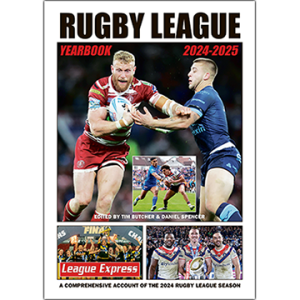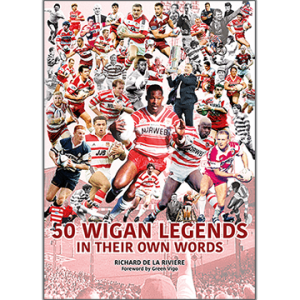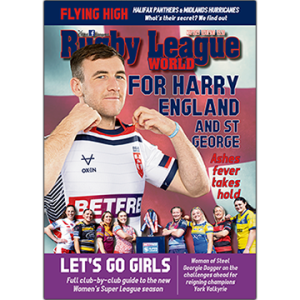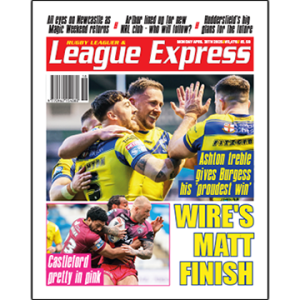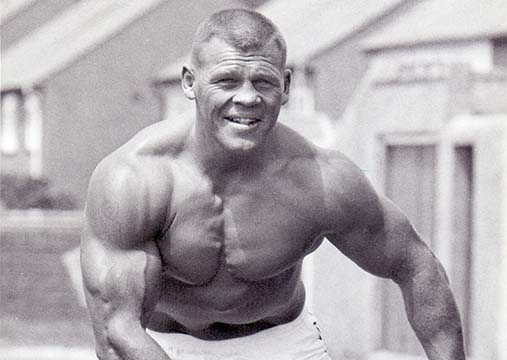
The Ultimate Showman
Described in Barrow’s Complete Who’s Who as “The ultimate Rugby League Showman” and the “most charismatic” player in the club’s history, Eddie Syzmala enjoyed eleven great seasons at Craven Park, winning two Division Two titles and earning three caps.
The club’s finest hour in that time was a remarkable Lancashire Cup Final success against cup kings Widnes in 1983 when they were in Division Two.
If you could relive one day from your career, which would it be?
The Lancashire Cup Final, as well as my England and Great Britain caps. When I was turning pro from Barrow Island, I told my sister I’d play for my country, so it was great to fulfil that dream.
You were 17 when the county borders were adjusted. Do you consider yourself Cumbrian or Lancastrian?
I was a proud Lancastrian, but I never liked the word Cumbria. I always liked Cumberland. That was a much better name. We were Lancastrians and proud of it. People weren’t too happy at the time, but you get used to it I suppose.
What was the local amateur scene like in the 1970s?
I played for Barrow Island under-19s against teams like Walney, Dalton, Askam, Roose and Holker. You didn’t get luxuries like changing rooms! We’d get changed behind a pub sometimes, but standards were very good and they were very happy days. It was still a step up when I signed for Barrow, because it was so fast, but I was always a good tackler, which stood me in good stead.
What were you paid and how did you find the early days of being a pro?
I got £450 signing on, and there was money for winning and losing. I think we got 20 quid a loss in Division Two. There was more for playing for Cumbria and Great Britain.
One thing I do remember was being a terrible traveller. All our away games were long journeys, and I was often travel sick. It made me go quiet, which the lads loved, but by the time I got to somewhere like Leeds, playing rugby was the last thing I wanted to do.
You were possibly the first player to develop your physique into that of a body builder. Why did that start? Was it an advantage in the collision? Did it affect your speed?
I did it on the side, but people at the club went mad with me because they thought I’d end up muscle bound. Now they’re all doing it. I’d finish my shift at 4.30, then go to the gym and then to rugby training. I could hold off three or four players sometimes, so it was an advantage – or I felt I could do that, so it gave me confidence. I was very fast for a forward and it didn’t affect my speed. Andy Gregory gave me a nice mention in his book about it.
You had a full-time job in the local shipyard where 14,000 people worked. What was it like going in on a Monday and working alongside your adoring fans?
If you had a good game, everyone wanted to talk about rugby. The bosses would want you to do your job, but sometimes it wasn’t possible. I got more work done if we’d lost! It was easier for the travelling players, but I was in the area 24/7.
Did you get to know Willie Horne?
Not really, but he was a very nice fella. He had a sports shop in the town, but he used to give the stock away because he was so friendly. They had to put him upstairs out of the way in the end! Derek Hadley and I had a testimonial in 1983, and he gave us a load of balls to auction off. I saw a car pulled over one day. A hand came out and beckoned me over. It was Willie, and he gave me a handful of sweets! He was so talented, not just at rugby but at things like table tennis and golf.
Who were the other tough players of your day?
There were so many in the game, but a couple of teammates spring to mind. Steve Herbert was a real workhorse – an unsung hero. He’d played for a few other teams before Barrow, and he told me once that I’d really hurt him in a particular game. I remembered the game because he kept running the ball in and he never buckled. I was delighted when we signed him at Barrow. You need players like him. Les Wall, our hooker, did the hard yards too. You need them as much as the tryscorers.
I remember one game at St Helens. As we were packing down, I tried to intimidate their forwards by reminding them they were due up at Barrow soon. George Nicholls stuck his head out of the scrum and just said, “We’ll be there, don’t worry.” I thought that was a great response.
Was your game too aggressive? Did it cost you further caps?
I did some stupid things, yeah. In 1979, we played Warrington on a Saturday with the Lions squad due to be announced on the Tuesday. I gave two stupid penalties away, and they kicked both of them. Eric Ashton was coach, but I think someone said to him, “He’s not coming!” Anyway, my son was born in 1979, and my wife had already told me there was no way I was going!
What was it like playing under the legendary Frank Foster. Was he as fierce as people say? And is there any truth to the rumour the Barrow directors wanted to sack him, but none of them actually had the courage to do it?
He wasn’t particularly fierce with us. He never really bollocked us much. We got on well – he made me captain and also made me kick goals, even though I never liked doing it because of the extra pressure. I think he was scarier to the opposition.
He was an excellent coach. He was from West Cumbria and be brought Smiler Allen and Spanky McFarlane down. I loved Smiler, even though we were both hookers.
I’m not sure about that story, but they did sack him after he’d been there ten years. He died in 2019 and he barely went to a rugby match after he left Barrow in 1983. He just wasn’t interested in talking about rugby.
You were selected for the Great Britain Under-24s against France ahead of David Ward in 1976.
That was amazing because they used to have the Tuesday-night games on the telly. Leeds were always on and Eddie Waring was always talking up David, so to get picked ahead of him meant a lot. The game in France was called the Battle of Albi because it was so dirty. It was six inches deep in mud. Every scrum I won, the ref would insist on another scrum. If France won the scrum, it was play on. Harry Pinner played for us, and we had a really good side. The Widnes prop John Wood had his head jumped on and woke up in an ambulance.
Tell us about the caps you won in 1979 and 1981.
Before the England game in 1979, we shared a hotel with the Liverpool team and I remember talking to Emlyn Hughes, who was also from Barrow. I remember them being so skinny!
It’s a huge privilege to play for your country, especially alongside talent like Stuart Wright, Jeff Grayshon, Keith Mumby, Des Drummond and Henderson Gill. I shared a room with Henderson – that was certainly memorable!
You didn’t play against the Aussies in an international, but you did for Barrow in 1982.
I was captain that day and it was only 3-2 at half-time. They had the likes of Steve Rogers, so they ran away with it in the second half.
What do you remember of the early rounds of the 1983-84 Lancashire Cup?
We won all the games away from home, so we really earned it. We won at Whitehaven, Salford and then Warrington in the semi-final. We beat Warrington by a point, and they were pressing like hell for a winner at the end.
Hull and Widnes were the best teams in the country at the time, so no one gave us a chance, but we were so confident as we went down on the bus that day. Man United and Liverpool will beat you 10-0 if you let them, but it’s different if you get stuck into them. We knew that and that’s what we did that day.
You certainly got stuck into Kevin Tamati. What happened in the tunnel when you were both sin-binned?
I get asked that all the time and I’ve never revealed it. He came in late on Steve Herbert, so I retaliated, and that’s why we got sin-binned. There was plenty of sledging too. When you got binned, someone was supposed to go down the tunnel with you, but no-one did and when we got to the changing rooms, they were locked. That’s all I’ll say!
Anyone can throw a punch, but tackling someone hard is different. That knocks the wind out of someone, and you earn their respect that way. I met Kevin years later at a dinner in Dalton, and it was nice to catch up with him.
What were the celebrations like?
Fantastic! The players and the wives went to a nightclub in Barrow to celebrate. No one expected us to win, but we had a good team. David Cairns played very well. When we got kicked out of the first division, we weren’t getting battered every week. We were losing games by just a few points, so we knew we were a good team when we were in Division Two.
How did you get the injury which forced your retirement?
I was at Barrow Island training in the dark, and we were doing a drill that involved carrying a teammate. I went down and knackered my leg. I thought I’d have to pull out of the Hull KR game a few days later, but with the lads ribbing me about it I stupidly played. I had to have an operation, and I didn’t play again.
The above content is also available in the regular weekly edition of League Express, on newsstands every Monday in the UK and as a digital download. Click here for more details.

